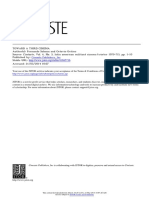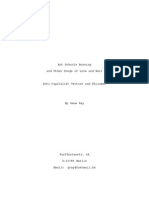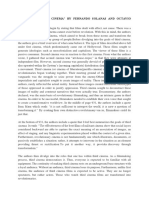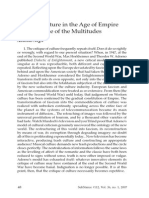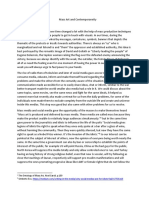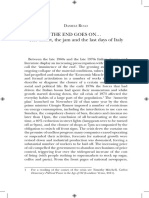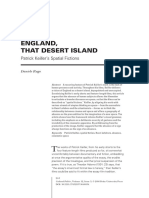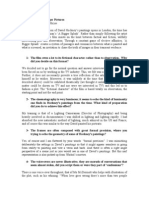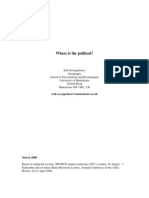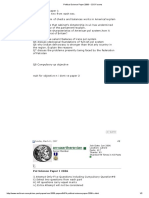0 ratings0% found this document useful (0 votes)
27 viewsOne+One: and The London Underground Film Festival Present "Revolutions in Progress" Screening and Discussion
One+One: and The London Underground Film Festival Present "Revolutions in Progress" Screening and Discussion
Uploaded by
paguro82The document discusses an upcoming event called 'Revolutions in Progress' screening and discussion hosted by One+One and the London Underground Film Festival. The event will feature a roundtable discussion on revolution with filmmakers, theorists and activists and will screen short films on the theme of revolutions in progress. It provides background information on the film challenge from One+One on the theme of revolutions in progress that inspired the short films.
Copyright:
© All Rights Reserved
Available Formats
Download as DOCX, PDF, TXT or read online from Scribd
One+One: and The London Underground Film Festival Present "Revolutions in Progress" Screening and Discussion
One+One: and The London Underground Film Festival Present "Revolutions in Progress" Screening and Discussion
Uploaded by
paguro820 ratings0% found this document useful (0 votes)
27 views2 pagesThe document discusses an upcoming event called 'Revolutions in Progress' screening and discussion hosted by One+One and the London Underground Film Festival. The event will feature a roundtable discussion on revolution with filmmakers, theorists and activists and will screen short films on the theme of revolutions in progress. It provides background information on the film challenge from One+One on the theme of revolutions in progress that inspired the short films.
Original Description:
3.12.11One+One LUFF event
Original Title
3.12.11One+One LUFF event
Copyright
© © All Rights Reserved
Available Formats
DOCX, PDF, TXT or read online from Scribd
Share this document
Did you find this document useful?
Is this content inappropriate?
The document discusses an upcoming event called 'Revolutions in Progress' screening and discussion hosted by One+One and the London Underground Film Festival. The event will feature a roundtable discussion on revolution with filmmakers, theorists and activists and will screen short films on the theme of revolutions in progress. It provides background information on the film challenge from One+One on the theme of revolutions in progress that inspired the short films.
Copyright:
© All Rights Reserved
Available Formats
Download as DOCX, PDF, TXT or read online from Scribd
Download as docx, pdf, or txt
0 ratings0% found this document useful (0 votes)
27 views2 pagesOne+One: and The London Underground Film Festival Present "Revolutions in Progress" Screening and Discussion
One+One: and The London Underground Film Festival Present "Revolutions in Progress" Screening and Discussion
Uploaded by
paguro82The document discusses an upcoming event called 'Revolutions in Progress' screening and discussion hosted by One+One and the London Underground Film Festival. The event will feature a roundtable discussion on revolution with filmmakers, theorists and activists and will screen short films on the theme of revolutions in progress. It provides background information on the film challenge from One+One on the theme of revolutions in progress that inspired the short films.
Copyright:
© All Rights Reserved
Available Formats
Download as DOCX, PDF, TXT or read online from Scribd
Download as docx, pdf, or txt
You are on page 1of 2
One+One and The London Underground Film Festival present Revolutions in
Progress screening and discussion.
One+One: Filmmakers Journal have teamed up with the LUFF to present a round table
discussion on the topic of revolution, with filmmakers, cultural theorists and activists. We will
be screening a selection of films submitted to our film challenge, Revolutions in Progress to
aid the discussion (details below). Along with this we will also launch and distribute free
copies of our December issue.
It takes place on Saturday, 3rd of December between 2-3.30pm at the Horse Hospital in
London. Discounted advance tickets are available for 3.50GBP here or 5GBP at the door.
Please join us for what promises to be an insightful and timely conversation about the place
of filmmaking and the screening of revolution.
Revolutions in Progress: A Film Challenge from One+One: Filmmakers J ournal
A map of the world that does not include Utopia is not worth even glancing at, for it leaves out the
one country at which Humanity is always landing. And when Humanity lands there, it looks out, and
seeing a better country, sets sail. Progress is the realisation of Utopias
Oscar Wilde, The Soul of Man under Socialism
The term utopia was developed by Sir Thomas More, a play on words between no-place
and good-place. It captures the eternal nature of ideas that can emerge again and again
throughout history and which are never reducible to human particularities, nor to reality as it
is. Dreams of the good always exceed their historical placing. Thus they demand critical and
dynamic thought, never a simple acceptance of the status quo or any idea of an end of
history. Utopia may never be reached, but this is what gives it its revolutionary potential. It is
always a critical impulse. The utopian idea appears as an imperative whose demands again
and again call us to action. Since the dawn of man utopian ideas and revolutionary action
has punctured human existence, albeit intermitted with reactionary and conservative breaks
where utopian dreams would appear to fade for all eternity. Yet these intermissions have
almost always been short lived. Badiou, for example, describes how the revolutionary period
from the French Revolution and the Paris Commune [1792 to 1871] and the period between
the Bolshevik revolution and the radical politics of the 60s and 70s [1917 to 1976] was
intermitted with a 40 year period of reappraisal where revolutionary politics appeared to
come to an end
i
. In this period, a vanguard group of artists and intellectuals had to
experiment, address issues brought up by the failings of the previous revolutionary period
and prepare for the next one. Within the intermissions between revolutionary periods we find
not only the reactionary backlash, but also intellectuals, artists and activists rethinking ideas,
reformulating and preparing the way for the next period. History is never-ending.
Today we find ourselves in another such intermission, Capitalism, with all its gross
inequalities, is here to stay, or so we are told by figures of nearly every political camp. Even
a huge financial crisis cant stop the forward march of the neo-liberal agenda. Yet something
else hangs in the air. A revolutionary fire is beginning to burn in the peoples hearts. In North
America and Europe drastic austerity measures are introducing a new generation to
revolution, the Arab world, likewise, is witnessing incredible revolutionary upheaval aimed at
ending tyranny and South America has been experimenting with populist socialist
movements driving towards a different economic model. Meanwhile, intellectuals and writers
as diverse as Badiou, iek, Negri, the invisible committee and Harvey have been inventing
innovative paths beyond meagre reformism, while inspiring a whole new generation.
Technology is equally causing the word revolution to resurface. Just as the radical spirit of
the 60s was occasioned by the birth of the TV and Popular media, so, the world asks, what
will be the effect of the internet, social media and the digital camcorder? Yet for many of us
what remains lacking is not the revolutionary vigour, but an idea. We know there is a need
for change, we just dont know how to think about it. Without an idea, each revolutionary cry
is easily subsumed into the neo-conservative demand for (capitalist) freedom and
(parliamentary) democracy, and the cries for genuine emancipatory justice go unheard. It is
hard not to miss the chasm that opens up between mere change and a genuine revolution.
One changes the world, but leaves the core problematic the same, the other addresses the
problematic at its core and pushes it towards a genuine resolution. Or as iek wrote on the
recent events in Egypt:
After Mubarak sent the army against the protesters, the choice became clear: either a cosmetic
change in which something changes so that everything stays the same, or a true break.
ii
If we are to succeed we must not only have a revolution, but genuine revolution grounded in
a genuine idea. A revolution without ideas is mere mindless violence, an order which
replaces itself with another order. Yet we must not simply sore off into flights of fantasy that
a genuine revolution is around the corner, or that the system as it is, is okay. We must face
the unpleasant facts, problems and dilemmas left to us by the previous epoch, without
resigning ourselves to the world as it is with all its horrific injustice and inequality. This is the
difficult task that any inventor/experimenter of culture faces today.
Only by grasping the idea and not merely the form of revolution can we hope to affect a
genuine change. When Godard made his film Sympathy For the Devil (or as he would have
preferred it called: One plus One) he was largely in the sway of such a cultural upheaval and
re-evaluation. The film was a revolution in process as much as it was in content. The film
layered imagery, music and quoted text to capture the sense of a revolution in progress: a
never ending revolution whose results will always remain undecided.
With these questions in mind, One+One set a challenge to its readers. It invited submissions
of short films which deal with the theme Revolutions in Progress. The film was to be both a
mix of drama and documentary in homage to the great revolution film Sympathy for the
Devil / One plus One, at least 50% of the film's dialogue/voice over (if any) was to be quoted
from somewhere else, copyrighted music was allowed, and the film was to be a maximum of
10 minutes.
i
Alain Badiou, The Communist Hypothesis, New Left Review 2/49, January-February 2008
ii
Slavoj iek, Why fear the Arab revolutionary spirit? The western liberal reaction to the uprisings in Egypt and
Tunisia frequently shows hypocrisy and cynicism, The Guardian, Tuesday 1st February 2011.
(http://www.guardian.co.uk/commentisfree/2011/feb/01/egypt-tunisia-revolt)
You might also like
- Christopher Gray All or Not at AllDocument2 pagesChristopher Gray All or Not at AllRobert E. HowardNo ratings yet
- # DELEUZE - Control and Becoming - A Conversation Between Toni Negri and Gilles Deleuze - The FUNAMBULIST MAGAZINEDocument20 pages# DELEUZE - Control and Becoming - A Conversation Between Toni Negri and Gilles Deleuze - The FUNAMBULIST MAGAZINEMohammad Ali Abu Ma'ashNo ratings yet
- Toward A Third CinemaDocument11 pagesToward A Third CinemaTinkaNo ratings yet
- Practical Utopians PrintDocument6 pagesPractical Utopians PrintFrancine NunesNo ratings yet
- The Alternative Future A Vision of Christian Marxism - Garaudy, Roger - 1974 - New York, Simon and Schuster - 9780671217501 - Anna's ArchiveDocument200 pagesThe Alternative Future A Vision of Christian Marxism - Garaudy, Roger - 1974 - New York, Simon and Schuster - 9780671217501 - Anna's Archiveaa bbNo ratings yet
- Intro To SI BookletDocument4 pagesIntro To SI BookletEmil SabotNo ratings yet
- There Is No Unhappy Revolution - Marcello TariDocument16 pagesThere Is No Unhappy Revolution - Marcello TariCristal VidrioNo ratings yet
- Anronio Negri - Art and Culture in The Age of Empire and The Time of The MultitudesDocument9 pagesAnronio Negri - Art and Culture in The Age of Empire and The Time of The MultitudesManuel GutiérrezNo ratings yet
- Toward A Third CinemaDocument11 pagesToward A Third CinemaarthurNo ratings yet
- Art Schools Burning and Other Songs of Love and WarDocument239 pagesArt Schools Burning and Other Songs of Love and WardharmaburningNo ratings yet
- Coudenhove Kalergi Practical Idealism EnglishDocument64 pagesCoudenhove Kalergi Practical Idealism Englishols3d100% (1)
- Courtisane CahiersDocument64 pagesCourtisane CahiersMauricio Freyre100% (2)
- Big Bridge #12Document1 pageBig Bridge #12q69msmdhppNo ratings yet
- The Platypus Review, 31 - January 2011 (Reformatted For Reading Not For Printing)Document5 pagesThe Platypus Review, 31 - January 2011 (Reformatted For Reading Not For Printing)Ross WolfeNo ratings yet
- Deleue0 Control and BecomingDocument7 pagesDeleue0 Control and BecomingjonmonseaNo ratings yet
- Cfront Ending: Alexander Brener, Third World ArtistDocument18 pagesCfront Ending: Alexander Brener, Third World ArtistDimitrina SevovaNo ratings yet
- Julia Kristeva Revolt She SaidDocument139 pagesJulia Kristeva Revolt She SaidLaura100% (4)
- Alain Badiou Tusinisa EgyptDocument2 pagesAlain Badiou Tusinisa Egyptjswhy1No ratings yet
- Film Studies (1) FinalDocument75 pagesFilm Studies (1) FinalHaseena P PNo ratings yet
- Art and Culture in The Age of Empire and The Time of The MultitudesDocument8 pagesArt and Culture in The Age of Empire and The Time of The MultitudesAndaçAkçakayalıNo ratings yet
- Costanzo Preve 2012 2Document5 pagesCostanzo Preve 2012 2rdamedNo ratings yet
- Ilcea 4454 PDFDocument11 pagesIlcea 4454 PDFTudorGNo ratings yet
- Gale Researcher Guide for: Utopian and Dystopian Fiction: Aldous HuxleyFrom EverandGale Researcher Guide for: Utopian and Dystopian Fiction: Aldous HuxleyNo ratings yet
- Cultural Insurrection: A Manifesto for Arts, Agriculture, and Natural WineFrom EverandCultural Insurrection: A Manifesto for Arts, Agriculture, and Natural WineNo ratings yet
- The Best Route To Change Engages All Voices CorrectionDocument6 pagesThe Best Route To Change Engages All Voices CorrectionNojus KumpisNo ratings yet
- Mass Art and ContemporaneityDocument2 pagesMass Art and ContemporaneityEmil AslanNo ratings yet
- Beyond Eurocentrism and MulticulturalismDocument12 pagesBeyond Eurocentrism and MulticulturalismJiyaNo ratings yet
- Everything, All the Time, Everywhere: How We Became PostmodernFrom EverandEverything, All the Time, Everywhere: How We Became PostmodernRating: 2 out of 5 stars2/5 (4)
- Change the World Without Taking Power: The Meaning of Revolution TodayFrom EverandChange the World Without Taking Power: The Meaning of Revolution TodayRating: 3.5 out of 5 stars3.5/5 (10)
- Brave New WorldDocument4 pagesBrave New WorldDalibor DoberšekNo ratings yet
- Control and BecomingDocument18 pagesControl and Becomingziggy00zaggyNo ratings yet
- The Promise That Never Was: A Critique of Post-1968 European "Autonomous" LeftDocument17 pagesThe Promise That Never Was: A Critique of Post-1968 European "Autonomous" Leftarvindtrust100% (1)
- Living Spirit of Revolt: The Infrapolitics of AnarchismFrom EverandLiving Spirit of Revolt: The Infrapolitics of AnarchismRating: 5 out of 5 stars5/5 (1)
- The Modern Man: The Future According To TofflerDocument4 pagesThe Modern Man: The Future According To TofflerImpello_Tyrannis100% (1)
- Brian Holmes - Recapturing Subversion - Twenty Twisted Rules of The Culture GameDocument15 pagesBrian Holmes - Recapturing Subversion - Twenty Twisted Rules of The Culture GameAldene RochaNo ratings yet
- Beyond Resistance - A Manifesto For The Millenium - Anarchist Federation - Anna's ArchiveDocument62 pagesBeyond Resistance - A Manifesto For The Millenium - Anarchist Federation - Anna's ArchiveAsia MooreNo ratings yet
- Debord 1997 ADocument5 pagesDebord 1997 AalexhwangNo ratings yet
- Alain Badiou - The Pornography of Democracy PDFDocument2 pagesAlain Badiou - The Pornography of Democracy PDFdicoursfigureNo ratings yet
- Heller - 2016 - "What Is Post-Modern' - A Quarter of A Century AfDocument11 pagesHeller - 2016 - "What Is Post-Modern' - A Quarter of A Century AfSergio MariscalNo ratings yet
- Viva la Revolution!: The Story of People Power in 30 RevolutionsFrom EverandViva la Revolution!: The Story of People Power in 30 RevolutionsNo ratings yet
- You Don't Know What You Think You "Know" About . . . The Communist Revolution and the Real Path to EmancipationFrom EverandYou Don't Know What You Think You "Know" About . . . The Communist Revolution and the Real Path to EmancipationNo ratings yet
- Mark Polizzotti - Why Surrealism Matters-Yale University Press (2024)Document157 pagesMark Polizzotti - Why Surrealism Matters-Yale University Press (2024)xyz xyzNo ratings yet
- Review of Soulevements Uprisings at TheDocument6 pagesReview of Soulevements Uprisings at ThemathisgasserNo ratings yet
- Democracy Disrupted: The Politics of Global ProtestFrom EverandDemocracy Disrupted: The Politics of Global ProtestRating: 4 out of 5 stars4/5 (4)
- It Was Good To See It Coming, But We Must Become Monstrous Enough Against It Francesco Salvini Raúl Sánchez CedilloDocument6 pagesIt Was Good To See It Coming, But We Must Become Monstrous Enough Against It Francesco Salvini Raúl Sánchez CedilloRaúl S CedilloNo ratings yet
- Waters - The West Is Stirring - First Things - 2019.1.31Document4 pagesWaters - The West Is Stirring - First Things - 2019.1.31Alvino-Mario FantiniNo ratings yet
- Critical Theory and The Frankfurt SchoolDocument18 pagesCritical Theory and The Frankfurt SchoolyasminelewisNo ratings yet
- Occupy Utopia: Utopia Is A Call To MourningDocument36 pagesOccupy Utopia: Utopia Is A Call To MourningAmma BiragoNo ratings yet
- The Utopian Globalists: Artists of Worldwide Revolution, 1919 - 2009From EverandThe Utopian Globalists: Artists of Worldwide Revolution, 1919 - 2009No ratings yet
- Jankelevitch - Should We Pardon ThemDocument22 pagesJankelevitch - Should We Pardon ThemElis SimsonNo ratings yet
- CLDH Enforced Disappearance EN 2008Document49 pagesCLDH Enforced Disappearance EN 2008paguro82No ratings yet
- War of The Camps REX BOULDERDocument6 pagesWar of The Camps REX BOULDERpaguro82No ratings yet
- Rugo Requiem PDFDocument16 pagesRugo Requiem PDFpaguro82No ratings yet
- CUP123 01rugo FF PDFDocument16 pagesCUP123 01rugo FF PDFpaguro82No ratings yet
- Political I Lam After The Ara Pring: Sign inDocument11 pagesPolitical I Lam After The Ara Pring: Sign inpaguro82No ratings yet
- Rugo Requiem PDFDocument16 pagesRugo Requiem PDFpaguro82No ratings yet
- Visions and Revisions: Hollywood's Alternative Worlds: David SterrittDocument8 pagesVisions and Revisions: Hollywood's Alternative Worlds: David Sterrittpaguro82No ratings yet
- Daniele Rugo: Contrapuntal Close-Up: The Cinema of John Cassavetes and The Agitation of SenseDocument16 pagesDaniele Rugo: Contrapuntal Close-Up: The Cinema of John Cassavetes and The Agitation of Sensepaguro82No ratings yet
- Following The Wires Presentation 0905Document13 pagesFollowing The Wires Presentation 0905paguro82No ratings yet
- Film ListDocument3 pagesFilm Listpaguro82No ratings yet
- Jack Hazan InterviewDocument2 pagesJack Hazan Interviewpaguro82No ratings yet
- Norris CavellDocument18 pagesNorris Cavellpaguro82No ratings yet
- HE Uture of Edagogy: THE Oncept and The DisasterDocument3 pagesHE Uture of Edagogy: THE Oncept and The Disasterpaguro82No ratings yet
- Nightbirds - Andy Milligan. An InterviewDocument3 pagesNightbirds - Andy Milligan. An Interviewpaguro82No ratings yet
- Interview With Flipside's Sam DunnDocument4 pagesInterview With Flipside's Sam Dunnpaguro82No ratings yet
- The Private Man and Society, Otto KirchheimerDocument25 pagesThe Private Man and Society, Otto KirchheimerValeria GualdiNo ratings yet
- Week 7 Ucsp HandoutDocument7 pagesWeek 7 Ucsp HandoutJIYAN BERACISNo ratings yet
- Initiatives Pour Influencer Les Elections Européennes 2014 (Open Society Soros)Document21 pagesInitiatives Pour Influencer Les Elections Européennes 2014 (Open Society Soros)Breizh Info50% (2)
- POLGOV by AdiDocument22 pagesPOLGOV by AdiRia Bariso0% (1)
- Sacrificing Youth (03apr2012)Document312 pagesSacrificing Youth (03apr2012)Dan V. HirslundNo ratings yet
- Macro Lesson PlanDocument8 pagesMacro Lesson PlanNISHA BijarniaNo ratings yet
- PDF HandlerDocument51 pagesPDF HandlerFernando AmorimNo ratings yet
- Political Science MCQs Practice Test 79 PDFDocument4 pagesPolitical Science MCQs Practice Test 79 PDFAalisha PriyaNo ratings yet
- Constitutional Reform Act 2005 - EssayDocument3 pagesConstitutional Reform Act 2005 - EssayLis HaNo ratings yet
- Daryl J. Levinson - Law For Leviathan - Constitutional Law, International Law, and The State-Oxford University Press (2024)Document313 pagesDaryl J. Levinson - Law For Leviathan - Constitutional Law, International Law, and The State-Oxford University Press (2024)Sorin GhinescuNo ratings yet
- Thesis 18022015 141826Document142 pagesThesis 18022015 141826elmoneyayaNo ratings yet
- PA 201 Course SyllabusDocument9 pagesPA 201 Course SyllabusFayyaz DeeNo ratings yet
- Public Administration in EstoniaDocument14 pagesPublic Administration in EstoniaAnonymous EzNMLt0K4CNo ratings yet
- Strict and Liberal ConstructionDocument16 pagesStrict and Liberal ConstructionClarisse AquinoNo ratings yet
- SwyngedouwDocument37 pagesSwyngedouwEvangelina Guerra Luján TheNomadNetworkNo ratings yet
- The State and International RelationsDocument267 pagesThe State and International RelationsKardina Karim Hamado100% (7)
- Popper - Democracy in AmericaDocument10 pagesPopper - Democracy in AmericaArch Arch ArchNo ratings yet
- Press ReleaseDocument4 pagesPress ReleaseSwati SinghNo ratings yet
- Pa 207 PointersDocument3 pagesPa 207 PointersJulie Ann NavarroNo ratings yet
- Injury To AliensDocument30 pagesInjury To AliensMamatha RangaswamyNo ratings yet
- Marxism and SocialismDocument37 pagesMarxism and SocialismElvie AngasNo ratings yet
- Bill Clinton Inaugural AddressDocument8 pagesBill Clinton Inaugural AddressCris CiubotaruNo ratings yet
- Homo OrbánicusDocument7 pagesHomo Orbánicuslbrunodf100% (2)
- Class 11 Political Science Chapter 2 Important Extra Questions Rights and Duties in The Indian ConstitutionDocument11 pagesClass 11 Political Science Chapter 2 Important Extra Questions Rights and Duties in The Indian ConstitutionniralalakshayNo ratings yet
- PHD Thesis Political ScienceDocument6 pagesPHD Thesis Political Scienceamberedmondsonnorman100% (2)
- 11th Political Science EM WWW - Tntextbooks.inDocument320 pages11th Political Science EM WWW - Tntextbooks.inmanoj pNo ratings yet
- The World of RegionsDocument2 pagesThe World of RegionsVinvinNo ratings yet
- (Nick Crossley, John Michael Roberts) After Habermas. New Perspectives On The Public SphereDocument185 pages(Nick Crossley, John Michael Roberts) After Habermas. New Perspectives On The Public SphereAvra CadavraNo ratings yet
- Political Science Paper 2006 - CSS ForumsDocument2 pagesPolitical Science Paper 2006 - CSS ForumsCH Naveed AhmedNo ratings yet
- The Oromo Gadaa Siqqee DemocracyDocument19 pagesThe Oromo Gadaa Siqqee DemocracyNatiphotography01No ratings yet


